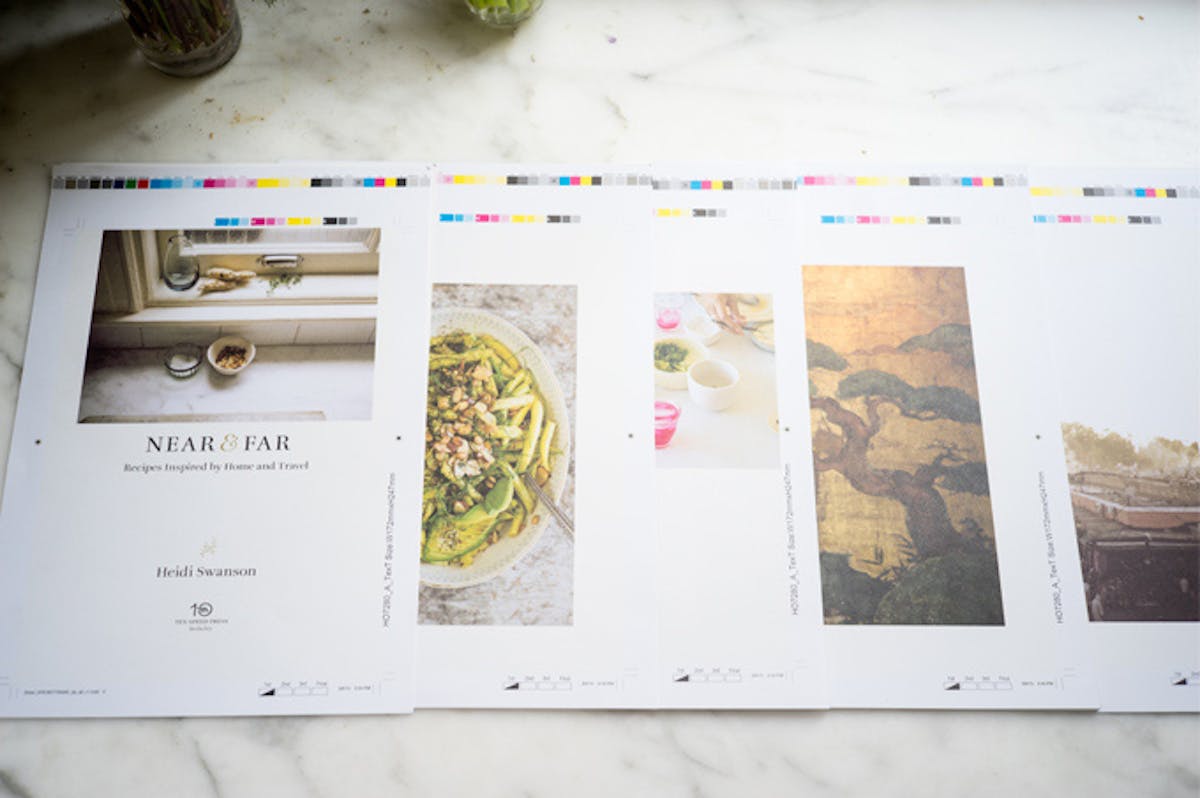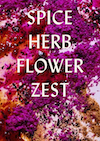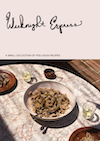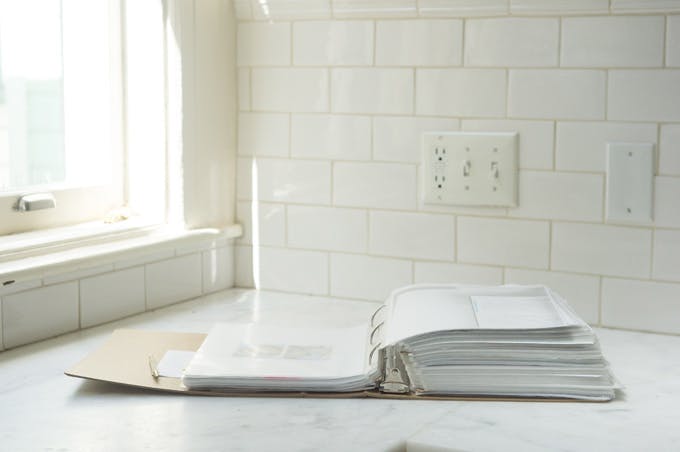Writing a Cookbook Proposal
How I approached my proposal for Near & Far - I get a lot of questions related to cookbook proposals. There are a number of reasons to write one. Most believe it's the step you need to take just before pursuing a book deal, which is often true. You write a proposal to get a book deal. To this I say yes, but that's only part of it. I'd argue that a good proposal has the ability to do much more than land you a contract.

I get a lot of questions related to cookbook proposals. There are a number of reasons to write one. Most believe it's the step you need to take just before pursuing a book deal, which is often true. You write a proposal to get a book contract. To this I say yes, but that's only part of it. I'd argue that a good proposal has the ability to do much more than land you a deal. A book deal is just one of the first steps in the long, very collaborative process specific to bookmaking. The real challenge, as an author, is getting a book at the end of the process that reflects your vision, or what you imagine as the collaborative vision - a book that is the successful melding of everything you bring to the project, along with the expectations and insights of your editor, publisher, and readership. This is a very tall order, and difficult to achieve. I'm completing my fourth cookbook, and I feel like I'm always learning more about the process. That said, it has become clear to me, the proposal is a critical piece of the puzzle. It's an opportunity to communicate exactly what I hope to work on, in a very specific way to the individuals I'll be potentially be collaborating with. And it is a document to refer to along the way if/when, you find yourself in the weeds.
I thought I'd use the proposal I did for Near & Far as an example today, with the hope that aspects of it might be helpful to some of you. Please know this is a process that is highly variable, it differs greatly from author to author, agent to agent, etc. and it can differ based on a thousand variables. This is simply how I have come to think about it - a glimpse at how I took what I've learned from previous books, and used the proposal as a way to help establish what I hoped and imagined for my next book. What I wanted to reach for.
I write and photograph my books, so my proposals reflect that. I like to include sample chapters/recipes and structure - more of a show vs. tell approach, others like to explain what their concept is, but might include less example content. I've seen incredible proposals that are strictly text, or text + illustration. Some proposals highlight individually-driven projects, others are focused team projects, or brand-based books - it's a huge spectrum. I've also seen proposals that are nearly completed manuscripts.
Pre-proposal: Let's talk about the stretch of time I think of as pre-proposal. It's important, and I feel like it's the stage many authors rush. For me, the more time I spend in pre-proposal mode, the better for the book in the end. I don't typically develop a formal proposal until I have about half of a book manuscript (and related photography) completed. At that point, I've spent enough time with the material and concept to know exactly what I want to do (and why), and I have a clear idea of how to finish. I understand the minutiae of what that will take, and what sort of timeline I need. All the while, I try to weave this process (or writing, cooking, and photographing) into my day-to-day life, around other projects, in a way that is maintainable. It isn't an option for me to drop everything and work exclusively on a book. I'm strict about taking as much time as I need, and seem to be on a 4-5 year cycle at this point. Because I don't like to feel rushed or overwhelmed, having content completed at the time I submit a proposal feels right for me. I like the idea that there will (or won't, if there's no interest) be very specific support related to the content in the proposal, and the way it is presented, minimizing surprises later.
Here's a look at my proposal process:
- 1. Once I've established a theme or general concept - start a binder, fill it with plastic sheet covers. Start adding content, stories, photographs, and recipes to it - copies of pages from journals, scraps of paper, notes, etc. One chunk or recipe, photo, or story per sheet. I like the plastic sheets because you can easily move things around with an eye toward flow, pacing, etc. Not just in the text, but also related to design and imagery as well. I like having a physical object to use and experiment with from the very beginning, and I maintain versions of it through to the end of the book process (in parallel with Word docs)...
2. Let the binder sit, adding to it when inspired, or when something feels right. I tend to stay at this stage for a long time.
3. Mock up Proposed Table of Contents (work / rework / play around)
4. Mock up Proposed Recipe List (work/rework/play around) Go back to step 2. Repeat as long as necessary.
5. Last, construct a digital version of the proposal, using the contents and structure of the binder as a blueprint. I use Adobe InDesign for this, but I imagine you could use whatever program you're comfortable with - Word, Photoshop, Ilustrator, even HTML.
Near & Far Proposal Structure: (Below)
- Sample Table of Contents
- 1 page proposal description (concept + short bio)
- Sample content (section openers + recipe pages)
- Past quotes & endorsements
This is what my proposal for Near & Far looked like. It's more for you to see the general vibe and structure versus reading the actual text, headnotes and recipes at this point. Following this graphic, I've included the first few pages of the PDF of the final version of Near & Far in a second big graphic. This way you can start to see how things shaped up. The point being, at least in my case, the proposal directly informs the final book. You can see how the fonts, design, and details evolved, but that the spirit is very much in line with the original proposal.

A sampling of finalized pages from Near & Far after going through editorial, design, and production process. (Below)

While the final version of Near & Far isn't in my hands quite yet (it's a Fall release), writing a proposal document in this way helped me establish a bit of a guiding light not only for myself, but also all the people who would eventually be involved at one point or another in the process. It's going to be different if you're a chef at a restaurant collaborating with a co-author, or if you're writing a trend-specific topical book with a quick turn-around, or if you're writing a culinary memoir. In any case, the proposal is an opportunity to communicate the spirit and specifics of an endeavor you think is worth pursuing.
One last note, related to a realm and process where projects are inherently dynamic and always changing. If you're working on a cookbook that is evolving dramatically from an intital proposal, it might be worth updating your proposal into a more current "vision document" of sorts - to help the process, wrangle cats, and get everyone involved looking and reaching in a similar direction. It can save a lot of time and frustration, and potential do-overs.
Hopefully this lends a bit of insight into this slice of the cookbook making process. There are a lot of informative voices out there if you poke around a bit! Here are a few other good links related to the early process of proposing and conceptualizing a cookbook to send you on your way. Although, I'm sure I'm missing many others, feel free to shout them out in the comments:
- Writing Your Own Cookbook (David Lebovitz)
- So You Want to Write a Cookbook (Michael Ruhlman)
- How to get a Cookbook Published (Andrea Nguyen)
- How to Write your First Cookbook (Alice Hart)
Near & Far Series:
- A New Cookbook
- Writing a Cookbook Proposal
- Making a Cookbook



Comments are closed.
Apologies, comments are closed.
Comments
i share adrianna’s sentiments exactly! your writing and photographs have an exquisite freshness that leaves a reader wanting more ….and more… am so very excited to add Near & Far to your other cookbooks that i have, treasure and count as ‘family’ in my kitchen…
thank you so much for sharing your process, in so doing, you have helped me to gain clarity with my own process & having a greater respect and giving more attention to the pre-work…like you say, what is invested ahead of time pays off in the long run with getting the results that are true to the author’s intent… thank you! 🙂
This is very interesting and helpful, and would work for any kind of book, I think. Thank you!
Thank you for sharing your process. Even if not writing a book proposal, it is fascinating to see how you arrive at the end product. Thanks for sharing!
This is so helpful Heidi! Even though I’m not writing a cookbook it helps me in my world of acting/making movies in figuring out the different ways to approaching a creative process in an organized, discipline manner.
Heidi, thank you so much for sharing your process with us! This information is truly valuable to what I’m working on right now. I can’t wait for your book to be published!
Thank you so much for letting us see this glimpse into your process. I love how intentional your work is, the quality is just outstanding. I’m in the process of writing my first collaborative cookbook and this post has really inspired me to get all of my thoughts onto paper and into images that will guide me through the process.
Can’t wait for your new cookbook!!
So beautiful. You are so professional, and talented. I love your photography, and your recipes. Thank you for sharing your process. Very stoked for this cookbook.
So generous of you to share this, thank you. Your timing is perfect. Looking forward to your beautiful new book.
As an acquisitions editor (for cookbooks), let me just tell you that I would flat-out SWOON if even half of prospective authors sent a proposal like that! (Don’t even ask what I normally get–it’s not called a “slush pile” for nothing.) Yours is gorgeous, well planned, and right on target in terms of what an editor is looking for. Now is there any way for you to multiply? 😉
omigod, cannot wait for this! i want to make those rye buttermilk cakes NOW. And everything else. Awesome post.
Wow, Heidi. Thank you so much for sharing your process. Your new book looks so beautiful.
How beautiful your work and how most wonderful for you to share your passion and heart with your favorite readers. Love your beauty.
WOW, thank you so much for sharing your insight and wisdom on how you compile your cookbooks…I have gifted your cookbooks so many times…and everyone I’ve ever given them to have instantly fell in love with your work like me :).
Best wishes! Can’t wait for this fall!
Many thanks to you for sharing your process here! I am working on a proposal but I am not a photographer and I am struggling with that. I do have ideas about how some recipes could be styled. I know that many publishers have their own photographers that they employ. I’m wondering if I should find someone to shoot some photos for me for the purposes of the proposal submission – or is that not a good idea? You’ve probably not had to deal with this since you’re a photographer but I just thought I’d ask anyway. Thanks again for a glimpse into your process.
HS: Hi Kim – I think it’s actually far more typical to submit a proposal w/out photography. My sense is that you might want to develop your proposal using your strengths – present and sell your idea and concept using the tools you are most comfortable with. If those are words exclusively, great. Have a look at some of the links at the end of the post up above if you haven’t already. There’s a good spectrum of advice in there for people at this stage. Different from my experience, but maybe more in line with the type of proposal you might end up developing.
Those dumplings! I can’t wait for this one!
Thank you so much for sharing this Heidi! I am such a huge fan of you and your cookbooks, and it is so much fun for me to have a ‘behind-the-scenes’ look at your creative process. I can’t wait to have Near & Far in my hands this fall!
First of all, I’m completely guilty of trying to enlarge the text on my mac big enough to grab that harissa farro recipe! I’m so eager for this book! I’ll wait till Fall, though 🙂
Congrats again, Heidi! I’m completely humbled that your books are a 4-5 year process! It clearly shows. Your books are flawless. Much love, Christina
I agree that your outline could apply to so many projects, it is so clear, yet rich at the same time. Can’t wAit for the book!!!
I always describe a proposal as a blueprint and one of its most valuable components is for after publication and that’s the marketing part. When you write the proposal is when you are most excited about your idea and full of enthusiasm. That enthusiasm can wane during the process of actually writing, revising, and producing the book and then months later when your book arrives it sometimes feels like a stranger your not sure what to do with.
Looking back at your proposal sparks that enthusiasm and inspiration for telling the world about your book. Can’t wait for Far & Near!!
Brilliant Heidi. Love you for posting this.
Beautiful and inspiring. I pre-ordered Near & Far recently and I can’t wait to see the final product!
I found this fascinating, and even inspiring. Even though I’ll probably never write a cookbook, this creative process is something that could translate to other projects.
Beautiful, cannot wait to get my hands on a copy!!! Thanks for sharing, the prospect of writing a cookbook seems less daunting after reading your notes. When is the cookbook available down under aka Sydney?
HS: Thanks Dawn (and everyone else with all your niceness & support!) I’m not sure about Australia yet – I’ll let you know when I know though!
you’ve gone above and beyond sharing this process, such a wonderful gift. This came at a good time as I’ve juggled here and there the idea of a book. I’ve followed you for years, have all your books and enjoyed many of your recipes and always with great delight.
thanks again, Heidi
Hi Heidi,
Thanks for sharing this. You are clearly a dream author for any publisher to have. As an agent and a book designer, I appreciate the thoughtfulness that goes into your pre-proposal process and explaining your 4-5 year cycle. I certainly work with some writers who produce books much more quickly than that, but they’re often writing books on a variety of topics and not as an extension of a blog or, in your case, an extension of a whole lifestyle. There are many reasons to write a book and just as many ways to go about it. So glad you gave us some insight into your process.
Hope to see you again sometime—it’s been years! Let me know if you’re ever in Austin.
Martha
fantastic information, I can dream : ) Thanks for sharing!
Dang, you’ve got this down to a T! I love the structure, the little quirky more personal photos and stories as well as fantastic recipes and gorgeous pictures of the result 😀 Thank you so much for sharing 🙂 x
Oh my goodness. Heidi, thank you for such a generous post and preview of your process and your forthcoming book (I CANNOT WAIT). I haven’t introduced myself before, but your blog was one of the initial inspirations for my own—I’ve been continually moved by the beauty and authenticity of your work. And of course, how gosh darn delish everything is. Your writing has often illuminated the path back to balance for me as a blogger, and for that I am eternally grateful. I moved from SF to LA in 2013, but I hope sometime we’ll have a chance to meet. xo from the K&C kitchen
Heidi, thank you for sharing your process. It’s always wonderful to see the creative thought behind the product – gives it a soul!
This is so thoughtfully put together and so considered. Thank you. What a wonderful opportunity to see a creative process carefully laid out and the insight it gives.
Your book sounds amazing. I know it will be on my Christmas list as the top present to give to people.
I love your recipes and the photograhs!
Thank you so much for letting us see the steps you take from inspiration to publication. Very useful tools for those of us who hope to publish in a different genre (poetry/photography in my case).
Thank you so much for your insight and sharing of the creative process! I’ve been such a big fan of your blog for quite awhile and am amazed at the eloquence, beauty, and imagery presented in them – now in a book!! I live in South Louisiana and have had it on the “back burner” to write a vegetarian Cajun/Creole cookbook and your post have given me some courage!! Thank you!
Most beautiful book you have ever created! Appreciating having a window into your process…. your work is stunning.
So inspiring and quite generous of you to share your process. I can’t wait for the book to come out!
This is so inspiring. Thank you for sharing, Heidi!
Heidi–I’ve always admired your work since day 1. Thanks for outlining the process of beginning a cookbook in such detail. It’s very inspiring. Can’t wait for your next cookbook!
Love these great tips and instruction on how to write a cookbook proposal. I love the spirit of sharing!
You’re incredible generous to share all this, Heidi. I greatly admire your process and the results you achieve with everything you do.
Absolutely GORGEOUS Heidi! I can’t wait for this book!
What a wonderful article Heidi. I wish I had done this for my first cookbook. You’re inspired me now to start a similar process for my second one. xx
PS. Your new book looks absolutely beautiful.
Thanks for sharing this post. It is a while that I have started working on a cookbook about Persian cuisine and you gave me some great ideas. Like you I prefer to have a physical object. Working with word and Photoshop right from the beginning makes me tired.
I guess I´m going to buy a binder soon. hehe
Thanks again
It has such as beautiful clean feel Heidi, and I also love that we’ll get to see more of the influences from all your travel… I can’t wait to get a copy!
Thank you for sharing this. I appreciate all of the information here and I think it is also great to see your work in progress. So often it seems that bloggers magically get a book deal and I think it helps to know that there is a lot of work that goes into creating it and making it happen.
I enjoyed reading about the process of creating a cookbook. That is something that has never occurred to me, ha , maybe because people who order take out don’t get to write cookbooks! But I think e writing process is the same and I’d love to write a book sometime. Because everyone, I find, has a story to tell.
What is revealed is a sweet calmness to a process that can consume. Nice.
You cleared my doubts, answered my questions, relieved my concerns in this one post. You inspire in so many ways and your simplicity in doing so is a talent that goes beyond. Thank you for sharing.
Thank you sooo much for this – it’s so nice to get some REAL advice!!! Congrats on the upcoming release, too 🙂
Wow, my heart is singing just looking at your layouts and photos! A friend of mine has published her cookbook and another one’s is coming out next month but neither of them look as wonderful as yours. Thanks for putting your finger on what is a very mysterious process for most everyone!
Heidi – thank you so much for sharing this. It is so fascinating to get an insight into the journey a book takes, from the first vague ideas to the finished book itself. Having now seen a few more pages of the book itself I am even more excited for the book to arrive in my mailbox (I pre-ordered it weeks ago). Your recipes are always incredibly inspiring and I love the way they seem to effortlessly blend the produce you find at the market with inspiration from near and far while making the most of what is no doubt a well-stocked pantry!
Thank you so much for sharing this process! I really am so excited for the book to come out 🙂
-Kelsey
Thank you for sharing this, Heidi, there really isn’t enough information out there for bloggers trying to get a cookbook published. With so many publishers reaching out, it’s easy to get sucked into a bad deal, whether financially or artistically. It’s really wonderful that you’re willing to share such valuable information on a process that really isn’t transparent at all!
Your work has so much finesse. Such an air to it, I can’t even explain it. It feels light and rich all at the same time. This is such an amazing post. Thanks for letting us see this creative process.
Comments are closed.
Apologies, comments are closed.
More Recipes
Weekly recipes and inspirations.
Popular Ingredients